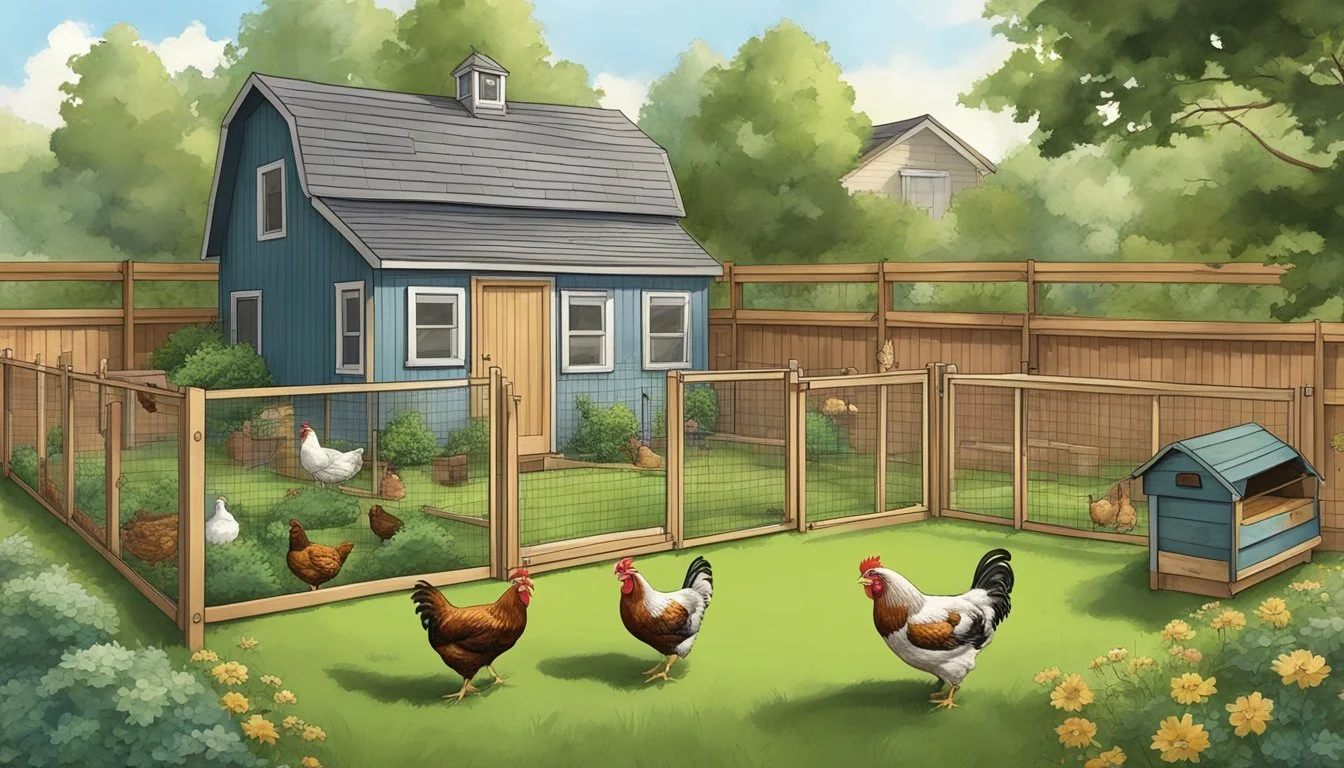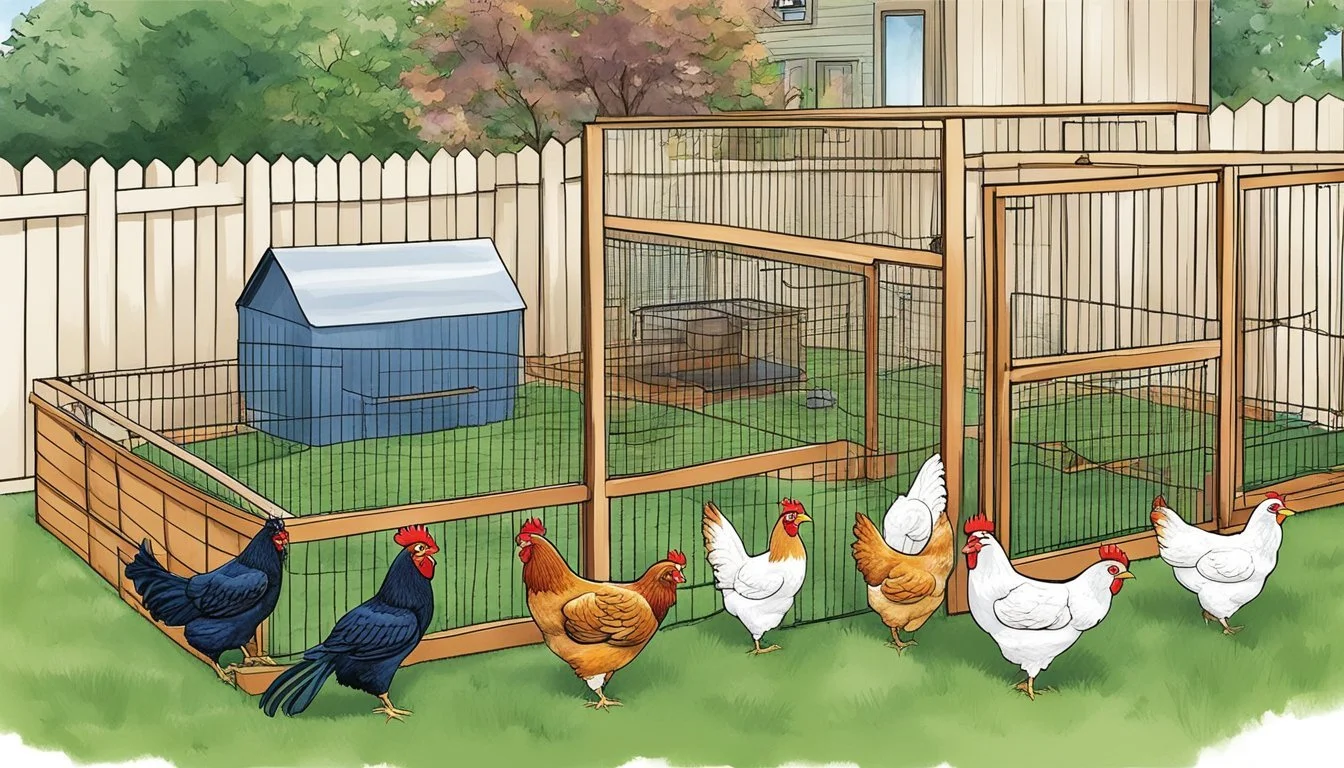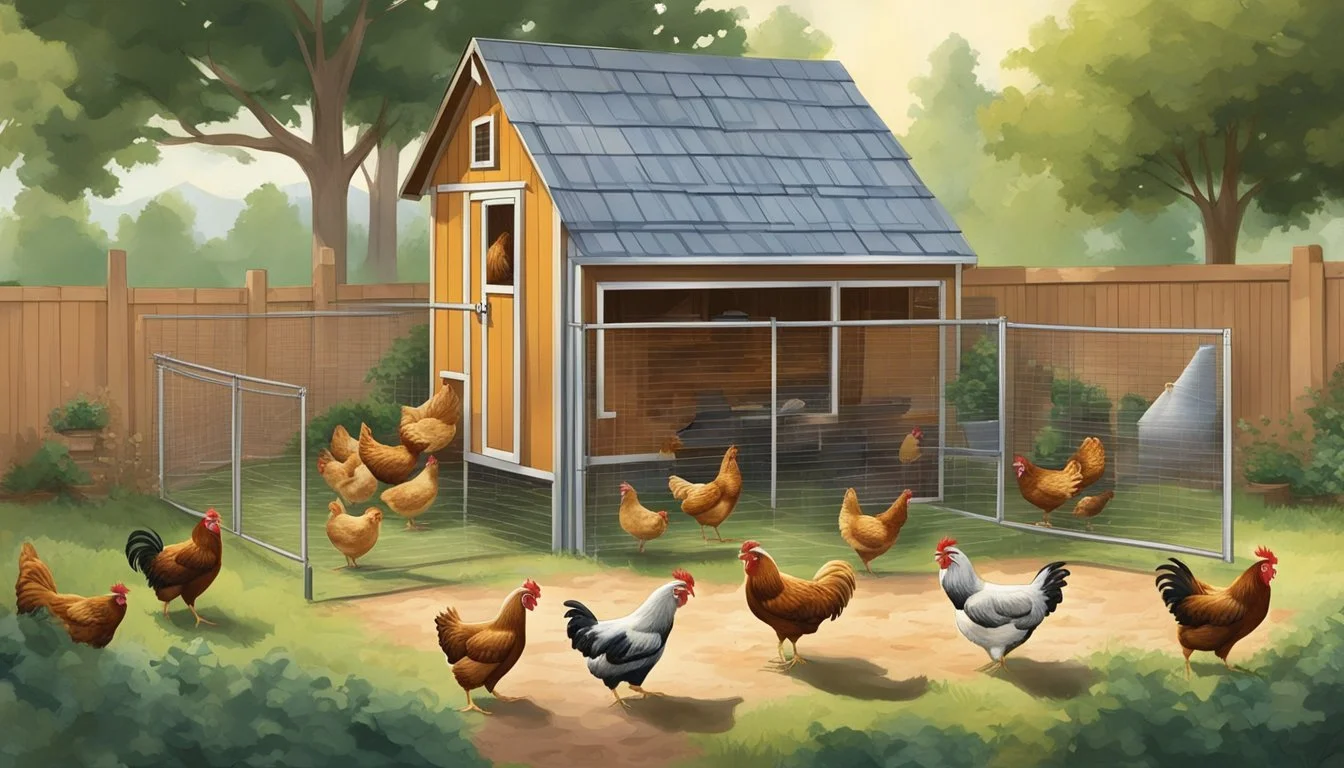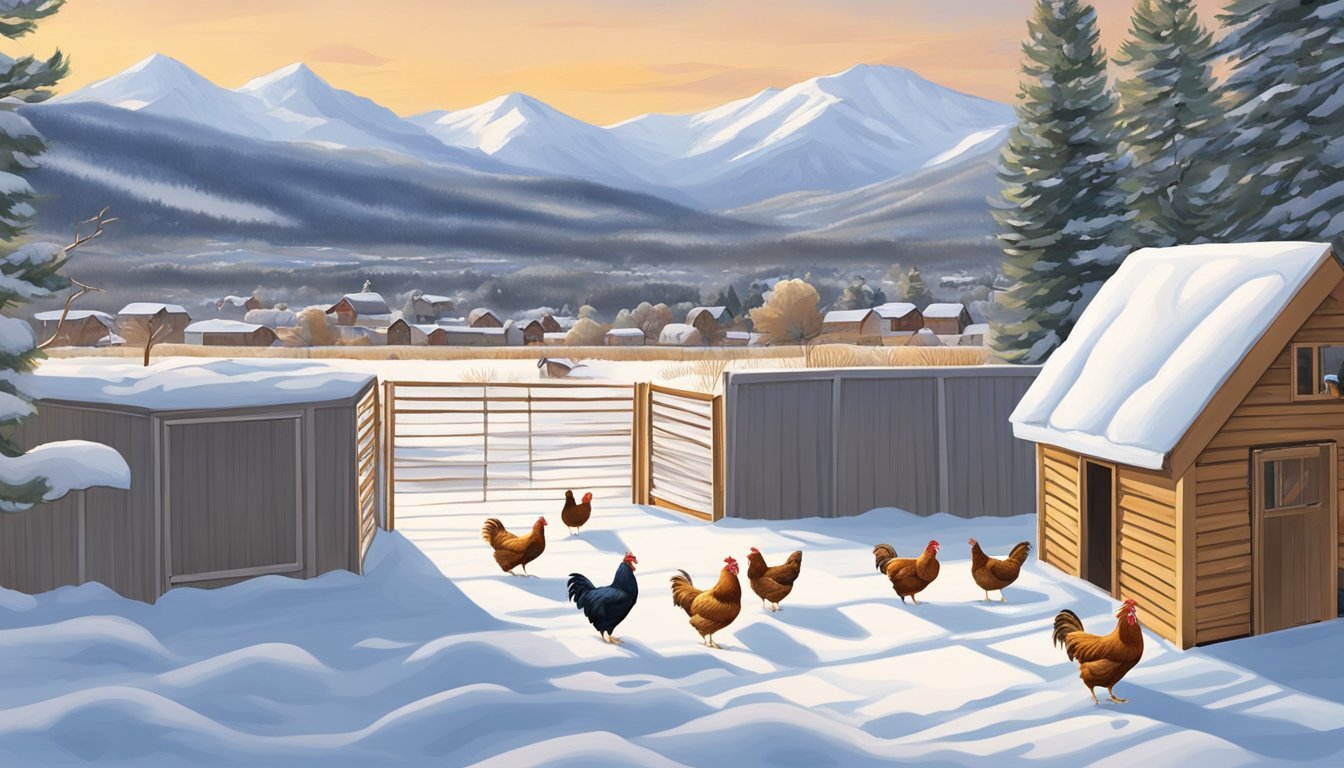Keeping Backyard Chickens in Denver, CO
Rules and Tips for Urban Poultry Farming
Keeping backyard chickens has become an appealing option for residents in Denver, Colorado, who seek the benefits of fresh eggs, natural pest control, and the enjoyment that comes from raising poultry. The city of Denver allows residents to keep chickens on their property for non-commercial purposes. To support urban agriculture and sustainable living, Denver's local regulations have been designed with consideration for animal welfare, neighborhood harmony, and public health.
Prospective chicken keepers in Denver are required to obtain a permit from the city’s Department of Public Health and Environment. This permit ensures that all chicken coops and runs meet the necessary standards for safety and sanitation. The city's ordinance limits backyard flocks to a certain number of hens, while roosters are not permitted, to minimize noise issues. Residents must be mindful of these rules to ensure they are in compliance with local laws.
This guide will offer important insights and requirements for raising chickens in the city, from understanding the legal framework to practical aspects of coop design, care, and management of the birds. It will serve as an essential resource for both aspiring and experienced poultry enthusiasts in Denver. Through informed practices, residents can enjoy the pleasures and advantages of backyard chicken keeping while adhering to the city's regulations.
Legal Requirements for Backyard Chickens in Denver
Residents of Denver interested in keeping backyard chickens must adhere to the city’s specific laws and ordinances. Compliance includes obtaining the proper permits and understanding the associated fees.
Understanding Local Ordinances and Laws
In Denver, the keeping of chickens falls under the city's zoning laws and local regulations. Residents must ensure that their property is zoned for the keeping of livestock or fowl, which includes chickens. Under Denver’s municipal code, individuals are allowed to keep chickens for non-commercial purposes, meaning the selling of chickens or their eggs is prohibited within city limits.
Permit Process and Fees
To legally keep backyard chickens in Denver, residents must apply for a Livestock or Fowl Permit. The process for obtaining this permit starts with contacting the City of Denver’s Department of Public Health and Environment.
Permit Application: Upon applying, prospective chicken owners must provide detailed information about their property and how they plan to house and care for the chickens.
Fees: A non-refundable fee is typically required for the permit application. Fees are structured as follows:
Initial Permit Fee: While the fee may be subject to change, there has been a reported cost of $50 for the initial permit application process.
It is important for residents to periodically review their permit status and any city code amendments, as regulations and requirements can evolve.
Choosing the Right Location and Coop
When embarking on backyard chicken keeping in Denver, CO, selecting an appropriate location and coop design is crucial for the well-being of the chickens and compliance with local regulations. These elements ensure a safe, comfortable environment for the birds while adhering to city ordinances.
Selecting the Optimal Location
The right location for a chicken coop within a Denver property must consider both zoning laws and the chickens' needs. Space allocated for the coop should follow Denver's zoning requirements, and checking with the zoning department is essential to confirm the specifics. The coop should be placed on level ground to avoid water pooling and should be well-drained. Providing adequate space not only ensures compliance with regulations but promotes healthy poultry behavior and easier maintenance.
Building permits may be required, so homeowners must contact the city's Department of Public Health and Environment beforehand. An ideal location is shielded from extreme weather, but still accessible for the owner's convenience in providing care and cleaning.
Coop Design and Space Requirements
A chicken coop in Denver must be predator-proof and sturdy to protect against common predators such as raccoons and foxes. The coop should provide at least 3-4 square feet of space per chicken inside and an attached chicken run offering an additional 5-10 square feet per chicken to allow for natural behaviors such as foraging.
Key features of a coop include:
Ventilation: Proper airflow while avoiding drafts directly on the birds.
Insulation: To mitigate the cold in winter months.
Nesting boxes: One box for every 3-4 hens.
Roosts: Ample space for all chickens to roost comfortably.
It's advisable to construct the coop with materials that are easy to clean and maintain; this will ensure hygiene and help prevent the spread of disease. Always consider the full-grown size of the birds when planning space requirements, and remember that the coop may need to accommodate growth if you decide to add more chickens to your flock later on.
Chicken Care and Management
Proper care and management are essential for the health and well-being of backyard chickens in Denver, CO. Owners need to provide a balanced diet, protect their flock from diseases, and maintain strict biosecurity measures.
Feeding and Nutrition
Chickens require a varied diet consisting of proteins, carbohydrates, vitamins, and minerals. Adult chickens thrive on a balanced layer pellet which should form the core of their diet. Owners can supplement this with whole grains, such as corn or wheat, for additional energy. Fresh greens, fruits, and vegetables can be given sparingly as treats. Access to clean, fresh water at all times is also crucial for their health.
Layer Pellets: Main diet
Whole Grains: Energy supplement
Greens/Fruits/Vegetables: Treats (in moderation)
Water: Always available
Health and Disease Prevention
Maintaining the health of a backyard flock involves regular observation for signs of disease, such as changes in eating habits or abnormal behavior. Good hygiene and regular cleaning are important for preventing illness. Biosecurity measures, such as limiting access to the flock by visitors and keeping the coop free of rodents and wild birds, are crucial to prevent disease spread.
Chickens should be monitored for common poultry diseases such as Marek's disease, avian influenza, and coccidiosis. Vaccinations may be available and are advised where there is a known risk of specific diseases. Any signs of illness should be promptly addressed by a veterinarian specialized in avian medicine.
Regular Observation: Detect early signs of disease
Cleanliness: Sanitize waterers, feeders, and coop regularly
Biosecurity: Control flock access, prevent contamination
Veterinary Care: Vaccinate and treat as needed
Specific Regulations on Types of Birds
In Denver, CO, the regulations for keeping birds and other livestock are precise and vary depending on the type of animal. Owners must comply with legal requirements to ensure the welfare of the animals and consideration of their neighbors.
Restrictions on Hens, Roosters, and Other Fowl
Denver's ordinances permit the keeping of hens, but with strict adherence to space and housing conditions. Roosters are also allowed; however, residents are limited to just one rooster per property. Regulations for ducks and other fowl such as turkeys and geese follow similar residential guidelines to ensure safe keeping and adequate space is provided.
Hens: Permitted.
Roosters: Limited to one per property.
Ducks/Turkeys/Geese: Regulations similar to those for hens and roosters.
Other Livestock Regulations
Beyond birds, the city has specific rules governing the keeping of other types of livestock. Equestrian animals such as horses, mules, donkeys, and burros are also allowed under certain space requirements. Similarly, larger livestock like cattle, sheep, goats, and swine are subject to zoning and space constraints. It is crucial for residents to understand that proper shelter, fencing, and distance from neighboring properties are emphasized in the stipulations for keeping these animals.
Horses/Mules/Donkeys/Burros: Allowed with space requirements.
Cattle/Sheep/Goats/Swine: Allowed, subject to zoning and sufficient space.
Benefits and Challenges of Raising Chickens
Raising chickens in Denver, CO, can offer a sustainable source of fresh eggs and contribute to waste management, but it also requires addressing challenges such as maintaining hygiene and ensuring protection from predators.
Egg Production and Consumption
Egg Production: Backyard chickens provide a steady supply of fresh eggs often superior in taste and nutrition to store-bought alternatives. A single hen can lay approximately 250 to 300 eggs annually, ensuring a consistent output for household consumption.
Egg Quality: Eggs from backyard chickens can be richer in nutrients, with potential increases in omega-3 fatty acids, vitamin E, and beta carotene, due to the varied diet hens can have access to outdoors.
Managing Waste and Avoiding Nuisance
Waste Management: Chicken waste is a valuable fertilizer high in nitrogen, phosphorus, and potassium. Composting chicken waste effectively turns a potential nuisance into a benefit for gardeners.
Hygiene Practices: To prevent waste from becoming a nuisance, it’s crucial to implement routine coop cleaning and proper waste disposal methods. This helps in controlling odors and deterring flies, maintaining a pleasant environment for both chickens and neighbors.
Predator Protection and Coop Security
Predator Threats: Common predators such as raccoons, foxes, and birds of prey pose significant risks to backyard chickens. Secure coop design is imperative to safeguard against these threats.
Security Measures: Coops should be fortified with solid walls, secure locks, and wire mesh to prevent predator intrusion. Regular inspections for potential vulnerabilities can prevent predation and ensure the chickens’ safety.
Local Resources and Support
Denver residents interested in backyard chicken keeping can find abundant resources and support within the city. Access to educational resources and community events empowers individuals to start and maintain healthy flocks in compliance with local regulations.
Classes and Educational Resources
Denver offers a variety of classes for both beginners and experienced chicken keepers. Wardle Feed & Pet Supply is a notable establishment that provides classes on how to care for chickens, covering topics from basic care to more advanced practices. Many of these resources emphasize sustainable practices and humane treatment, ensuring that chicken enthusiasts are well-informed.
Introductory Classes: Learn the basics of chicken keeping, including coop construction, chicken health, and local ordinances.
Advanced Classes: For those with some experience, further education on breeding and chicken behavior is available.
Local Chicken Community and Events
The local chicken community in Denver is active and supportive, hosting events that cater to enthusiasts of all levels. Individuals can connect with fellow chicken keepers through:
Community Forums and Social Media Groups: Places where individuals share advice, trade supplies, and offer support.
Local Events: These include poultry shows, coop tours, and educational workshops, which provide opportunities to learn and network.
Seasonal Considerations
When keeping backyard chickens in Denver, Colorado, one must navigate through the state's varied climate conditions. The region's distinct seasons require particular attention to ensure the well-being and productivity of the flock.
Adapting to Colorado’s Climate
Chicken keepers in Colorado should be well-aware that the state's climate is characterized by cold winters and a wide range of temperatures throughout the year. It is vital to ensure that the coop is prepared for winter to keep chickens warm and protected from the elements. Insulation, proper ventilation to prevent moisture buildup, and heated waterers are key components to consider for winterizing the coop. In spring, transitioning from cold to warmer weather, one should check for and repair any damage to the coop from the winter, such as leaks or drafts, as these can affect the chickens' health as the seasons change.
Spring Preparations for Chick Season
Springtime signals the onset of "chick season," a time when many backyard chicken enthusiasts acquire new chicks. It's essential to set up a brooder, a warm and safe environment, for the new chicks until they are ready to join the outdoor flock. The brooder area should maintain a consistent temperature — starting at around 95 degrees Fahrenheit during the first week, and decreasing by 5 degrees each subsequent week until the chicks are feathered adequately, usually by 5 to 6 weeks of age. Spring preparations also include making arrangements for pullets (young hens) as they transition from the brooder to the coop, ensuring the process is smooth and that the coop is ready to accommodate new members safely.
Navigating Chicken Keeping During a Pandemic
During the pandemic, Denver residents turned to backyard chicken keeping as a rewarding practice amidst uncertain times. The surge in popularity was motivated by several factors, including the desire for food security and the therapeutic benefits of animal care.
Setting Up a Backyard Flock: Those starting a chicken coop must consider space, as chickens require room to roam and roost. Proper shelter and protection from predators are essential, along with access to fresh water and a balanced diet to maintain the flock's health.
Biosecurity Measures: Maintaining biosecurity became paramount to protect both the chickens and their keepers from potential disease transmission. Regular hand washing and the disinfection of equipment helped minimize risks. Chicken keepers should also:
Monitor health: Watch for signs of illness and seek veterinary advice promptly.
Limit exposure: Control access to the flock to prevent contamination from visitors or other animals.
Stay informed: Keep up-to-date with local regulations and health advisories affecting poultry.
During this time, local communities found support in sharing resources and knowledge, making the endeavor less daunting for newcomers. The experience of nurturing a backyard flock offered Denver's residents a sense of accomplishment and connection to nature, which proved especially valuable during periods of social isolation.
Additional Cities and Their Regulations
Each city in Colorado has its own set of regulations concerning the keeping of backyard chickens. It is important for residents to be aware of the precise rules that apply to their municipality.
Regulations in Colorado Springs, Lakewood, and Arvada
Colorado Springs:
Residents may keep chickens with certain limitations. They are required to maintain coops in the backyard and adhere to setback requirements from property lines and neighboring dwellings.
Lakewood:
In Lakewood, homeowners can have chickens in their backyards. A permit is not typically required, but there are restrictions regarding the number of chickens and the necessity for coops to be predator-resistant.
Arvada:
Arvada permits the keeping of backyard chickens; however, the number allowed varies depending on lot size. Additionally, coop regulations must be followed, and cleanliness is emphasized to prevent nuisances.
Chicken Keeping in Aurora, Fort Collins, and Thornton
Aurora:
Backyard chicken keeping is allowed in Aurora, with residents needing to follow specific guidelines on the number of hens, coop structures, and location on the property.
Fort Collins:
Fort Collins residents are permitted to keep chickens with guidelines similar to other cities, focusing on proper shelter and sanitation, as well as a limitation on the number of chickens based on the size of the property.
Thornton:
Chickens can be kept in Thornton under city regulations that provide specifications on coop construction, distance from neighboring properties, and measures to address waste management and noise control.










